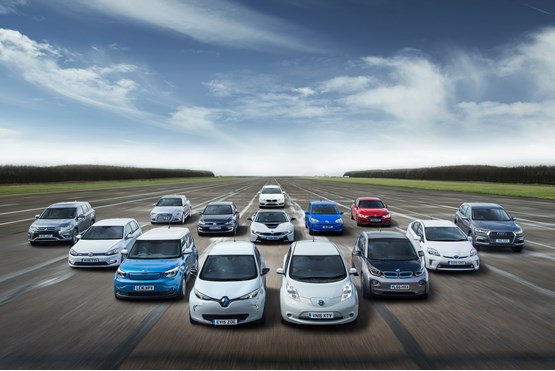Advertisement feature from Go Ultra Low
More and more UK fleets are realising the multiple benefits that electric vehicles bring, and can now promote their work through the Go Ultra Low Companies initiative.
Motorists in the UK are buying more electric vehicles (EVs) than ever. Since 2011, when the first plug-in car grant application was received, the number of EVs on our roads has risen steeply. More and more motorists are switching to electric and benefiting from low running costs, tax incentives and a great driving experience.
By the end of June 2016, there were more than 70,000 electric vehicles on our roads. This rapid surge in uptake has been primarily driven by the UK fleet market – with private and public sector organisations’ EV purchases making up 72% of the market. Additionally, 45% more electric cars have been registered to corporate buyers during the first half of 2016.

The reason for this is clear. As any seasoned fleet manager will tell you, fleet best practice dictates that vehicle operating choice decisions should be based on whole life costs, because they provide the best forward estimate of the real costs to an organisation, in delivering business mileage over a replacement cycle. Never has this been more relevant than in respect to electric vehicles – despite their higher P11D values, EVs are cheaper to operate than petrol or diesel equivalents and fleets are realising this in record numbers.
Latest figures from Lex Autolease illustrate how higher P11Ds are more than offset by significant fuel savings, notwithstanding recent falls in the pump price of petrol and diesel an estimated 20-40% reduction in SMR costs and tax benefits.
For example, data from July 2016 reveals that running a Nissan LEAF Acenta over four years/60,000 miles will deliver a potential saving of £70 a month over a Ford Focus 1.5 EcoBoost Zetec S. This equates to £3,360 over a four-year operating cycle – multiply that by a fleet of just 10 cars and the savings increase to nearly £34,000 over four years.
Smarter businesses are well on the road to emission-free and low-cost motoring, taking significant numbers of EVs onto their fleets, learning how they work and where they are fit for purpose. The organisations that have gained ‘Go Ultra Low Company’ status are perfect examples of how to make EVs work within a business, while laying the foundations for a massive technology step-change in the future.
The Go Ultra Low Companies initiative recognises organisations that are leading the electric motoring revolution by using electric vehicles (EVs), and pledging to buy even more. The response to the scheme has been excellent, from both the private and public sectors – ranging from small businesses like Spacestor to the University of Cambridge.
One of the aims of Go Ultra Low is to encourage every business in the UK to adopt electric vehicles into their fleets and offer their employees the chance to drive or own one. Not only are they cleaner, but, as the whole life costs numbers show, they can save businesses and employees money.
If you’re reading this and run electric vehicles on your fleet – Go Ultra Low wants to hear from you. Visit the website (GoUltraLow.com/fleet) and apply for Go Ultra Low Company status.
Any public and private sector organisations that already use EVs, or offer them to employees as company cars, are eligible for Go Ultra Low Company status, providing there’s a commitment for EVs to make up at least 5% of their vehicle fleet by 2020.













Login to comment
Comments
No comments have been made yet.